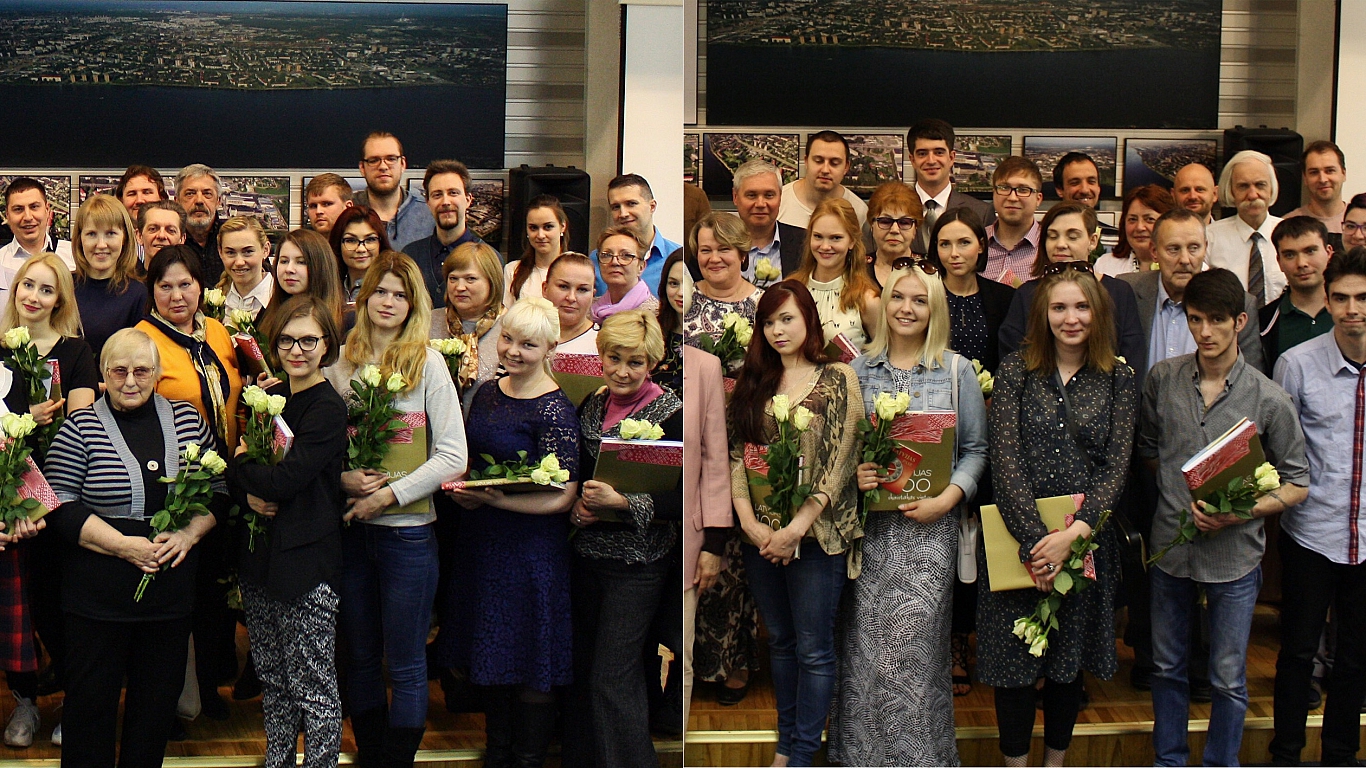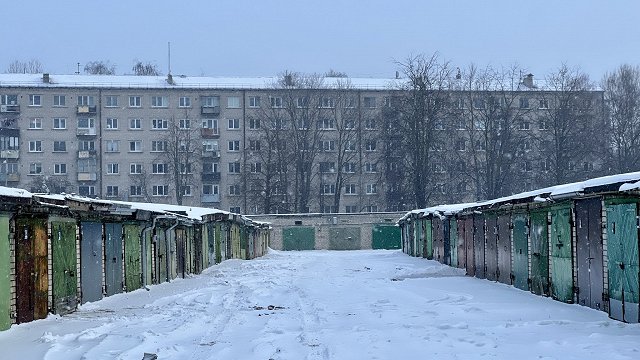Anna's ceremony
It's interesting how different people interpret events depending on their personal feelings.
Now I see two tables, on which are books to be handed to people who've just become citizens. On the left is the flag of our country, with a candlestick in the background. Associations arise with a tavern, a small, cozy and folksy one, perhaps one found by a provincial road.
On the right is a screen with views of Latvia. The musical accompaniment reminds me of places where they practice salt therapy. It's nice that a healthy procedure comes to mind, as right now I too am at the very center of a procedure, the solemn oath ceremony... The ambience is like that of David Lynch, somewhat cozy and very mysterious. But it also has deep darkness and splendor, like in that famous picture of his.
What does 'non-citizen' mean?
On October 15, 1991 the Supreme Council (the interim parliament) granted citizenship to Latvians who were citizens during the inter-war period, and their offspring.
As a result, a third of Latvian residents who were largely Soviet-era immigrants became non-citizens with an ambiguous legal status. During the last 25 years, 150,000 non-citizens have been granted citizenship under the naturalization program. About 250,000 are still non-citizens and don't enjoy certain rights, like the right to vote or hold certain public offices.
Read more about the historical context HERE.
My own ceremony has about sixty other people there. Local councilor Irina Vinnika (Harmony party) is giving a speech. It's simple and banal in places. But her words encourage my lachrymal ducts to bring forth liquid quickly (I start crying).
The councilor and her ceremonial speech add a kind of strange excitement to the event. Strange, because it's feverish. People are overwhelmed or even feel anxious. Everyone who comes up to sign the oath and receive the gift, "The 100 Best Places of Latvia", is shaking a bit. Someone stumbles a bit on the way. It's not at all comical. It's just that the worries make their legs tie up.
My attendance, or rather the small fuss going on about my person, is irksome. I'm the 'well-known journalist' with the serialized blog about (non-)citizenship, and the one who has to give a speech when it's all ending. I mutter, my voice creaking from the stress:
"Now I feel at home here."
I go on to say a few parting words - see, it's not as hard to obtain citizenship as people say and everyone should find the motivation to do it.
I should have felt like this was part of an important mission. But somehow I failed. I simply felt the whole thing deeply and personally.
To be honest, at the very end, Mrs. Vinnika's words, that Latvia is my home, did get to me. However after the ceremony I felt suspicious. It felt unpleasant that with similar simple tricks one can also be casually lured, for example, into a religious sect. That's the way it usually goes, the cult leaders exploit your weak points and, bit by bit, you start to lose your ability to think critically.
Maybe that's exactly my motivation in the end, one I advise everyone to find for themselves. My motivation lies neither in citizens' rights, like the right to vote, nor their obligations. But in the feeling of home. Not one where you're always expected but one which I can always define as my own.
It's banal, full of pathos (and why not?). But at least I'm being fair.
Now you know how to lure me into a sect.
However, it's a rhetorical question as to whether the worried non-citizens need an inauguration ceremony like mine. Just how much is the councilor's presence needed during the oath ceremony with such speeches? I know many people who had just about enough of that sort of thing to work themselves up, to cry or feel insulted. And it's not the oath or the councilor or the migration service employee that does that, but the lack of an integration program in our country.
Ksenia's ceremony
To me the ceremony was a journalistic task. Just like an interview with the president or a report from a protest. It means asking for time off work, arrive at the scene on time, lock my bike... meld with the crowd and do what I'm told. And after it's over I absolutely must take the flowers back to work safe and sound.
I failed in my task of melding with the crowd. I was too immaculate for the surroundings with the black shirt and pants. There were few who were dressed as formally as me. Mostly people came like they go to work or study. Before the start of the ceremony colleagues from LTV called me to the other end of the hall for an interview, and all my attempts to blend in failed miserably.
Not long before that I met Olya. We took the exam together. She's a young mother who wants citizenship for family reasons. She passed the exam on her second try; she'd failed the Constitution part the first time. She was worried and so was I, so we simply chatted about everything in the world in the time we had left, from posters on the wall to US-Russian relations. Like I do with my journalist colleagues before press conferences.
If someone asked me what's the ceremony itself like, I'd say it's like getting married at the registry office. Somewhat festive, formal, and simple.
A Riga City councilor and the head of the migration affairs department are giving a speech. Everyone sings the anthem, gives an oath and signs it one after another. After that they're given three roses and a brochure-book about the most beautiful places in Latvia. Then a televised president of Latvia appears with migration office employees who take a photo of the newly-initiated citizens. During intermissions a musician plays a guitar with songs by Raimonds Pauls and Guntars Račs. It all takes about an hour and a half, after which the participants disperse to wherever they need to be.
I did not feel any special emotions, just lighthearted joy that I'm one more step closer to getting a new passport, so it's difficult to write about the ceremony. It's just that there's not much to say. Well, I do love flowers even though they're awfully inconvenient to carry. The book is alright too, as it served as an inspirational guide during my vacation when I wanted to drive around Latvia.
I did not have any different view towards the state after the ceremony, and my outlook on myself as a part of the state did not change either, for that matter. I still doubted whether my voice counts, and I still don't know who I'll vote for in next year's [parliamentary] election.
Would-be mothers who have reservations over their motherhood are often told they'll fall in love with the child as soon as it's laid on their breast. After the ceremony it became interesting to me whether I'd fall in love with my new status after receiving the red-colored passport in my hands. Would I become a better citizen and neighbor, would anything change at all? My intuition told me no.
Skipping forward I'll tell you that a feeling of home did come to me soon after the ceremony, but from a very unexpected place. I joined a Facebook group dedicated to my neighborhood. People share photos, news and complaints about their neighborhood there, and sometimes engage in collective problem-solving.
Suddenly the faceless high-rises with anonymous dwellers became houses with thousands of neighbors. Everyone has similar problems. One woman complained, for example, about a huge hole in her yard. The members of the group quickly forwarded her to the responsible municipal worker. It was soon filled. It turns out you don't have to have the right to vote to change your house, your yard, your neighborhood for the better.
You simply have to maintain contact with your neighbors and find people who have faced similar problems and know who to turn to.
When you know that you're not the only one who loves your neighborhood, it becomes a home too.
Our 'naturalization' process is practically over. The last obstacle is receiving the passport as you have to wait a cabinet decision for a month and a half following the ceremony.






























